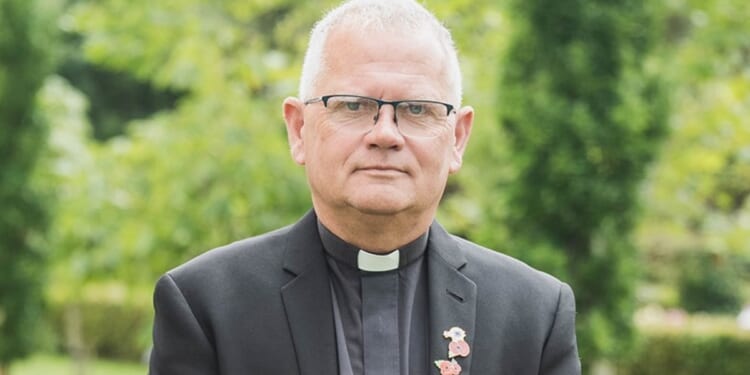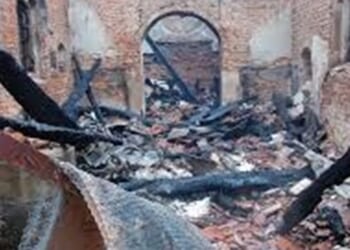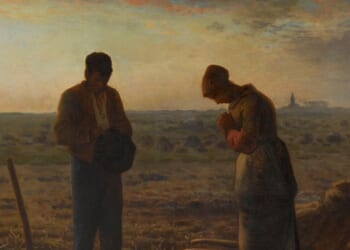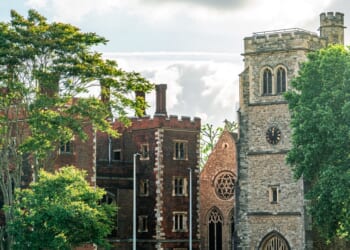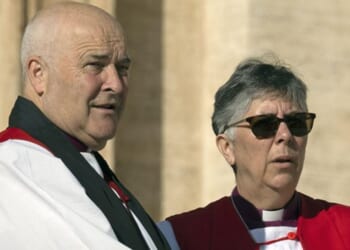TWENTY years of the Civil Nuclear Constabulary (CNC) has been marked by a service that commemorated members who had died while serving in it.
The CNC’s chaplain, the Revd Ian Grainger, welcomed officers and staff from across all divisions and directorates, and representatives from the 15 CNC operational units, to the service at the National Memorial Arboretum last month.
He lit a candle that “served two purposes”, he said. “It was a memorial candle, remembering those officers who’ve died in service, but also it was almost like a party candle, and we celebrated the 20 years of the CNC in its current format.”
Afterwards, a wreath was laid at the base of an oak tree located in The Beat, an avenue of trees that are each dedicated to an individual force as a memorial to “all who have lost their lives whilst in police service”.
Mr Grainger said of his ministry that “You are entering their environment to provide a particular service to these people, and you are there for them to use you or not, as the case may be.”
He believed that the biggest challenge that the staff faced was the unknown: “The threat of terrorism attacks is a regular thing; so I would guess that preys on their minds a lot, working in the environments that they do, particularly those officers that are within the nuclear sites.”
A former colleague had described chaplaincy as “loitering with intent”, which resonated with him. “You are there alongside people, but making sure you don’t get in the way of their day-to-day activities, but that they know you are there, and you are physically there to support them in whatever way you can.
“The nature of the role itself is not very different from anything else that you do in chaplaincy, and, in many ways, not too dissimilar from what I do in parish life, in that it’s about being there, being open, being a presence, and getting alongside people.”
Given the demands of supporting others, Mr Grainger sets aside time for himself. To relax, he enjoys watching rugby league, listening to music, spending time with his grandchildren, and walking his cocker spaniel, Skye.
He said that it was “vital” that he remain independent, so that officers and other staff members felt comfortable approaching him. “Everybody in the organisation matters, and they need to understand that nothing is too trivial. We’ve made sure that contact numbers and email addresses for me are available so that they can get hold of me at any time, whoever they are.
“Some things are obviously spoken about in confidence; other things are purely and simply for advice. A group of the administration staff earlier this year started talking about Lent, which took me by surprise somewhat: I wouldn’t have expected that. But we ended up having a half-hour conversation about Lent and what it means. I do believe that, without the chaplaincy being created, that opportunity may not have arisen. It was a very positive discussion with people.”
Mr Grainger was ordained in 1992, but said that he had felt a sense of calling since he was 15, when he decided to study religious studies in the sixth form, “out of the blue”. “At that point in time, in secondary school, I had no real interest in religious studies, even though I was brought up in a Christian family. Sitting in the classroom doing RE really didn’t interest me, and I was renowned for actually falling asleep during lessons.
“So, when people asked, ‘Why have you put that down?’ rolling off my tongue were the words, ‘I’m going to be a vicar.’ I tested the calling by taking an apprenticeship in the shipyard. So I did a four-year electrician apprenticeship and, at the end of it, I went back to college and after that went to selection.
“Within chaplaincy, there are so many, if you like, irregularities that can be fun, but rewarding and serious at the same time. People might never need you, never want you, but also, at the same time, you might just be that one wheel in the cog that’s missing for them, and you could just make a huge difference by simply being there.”

